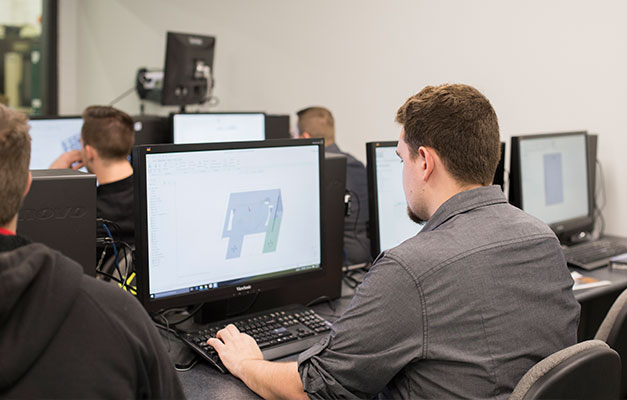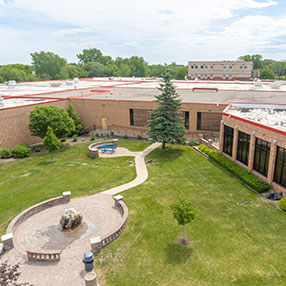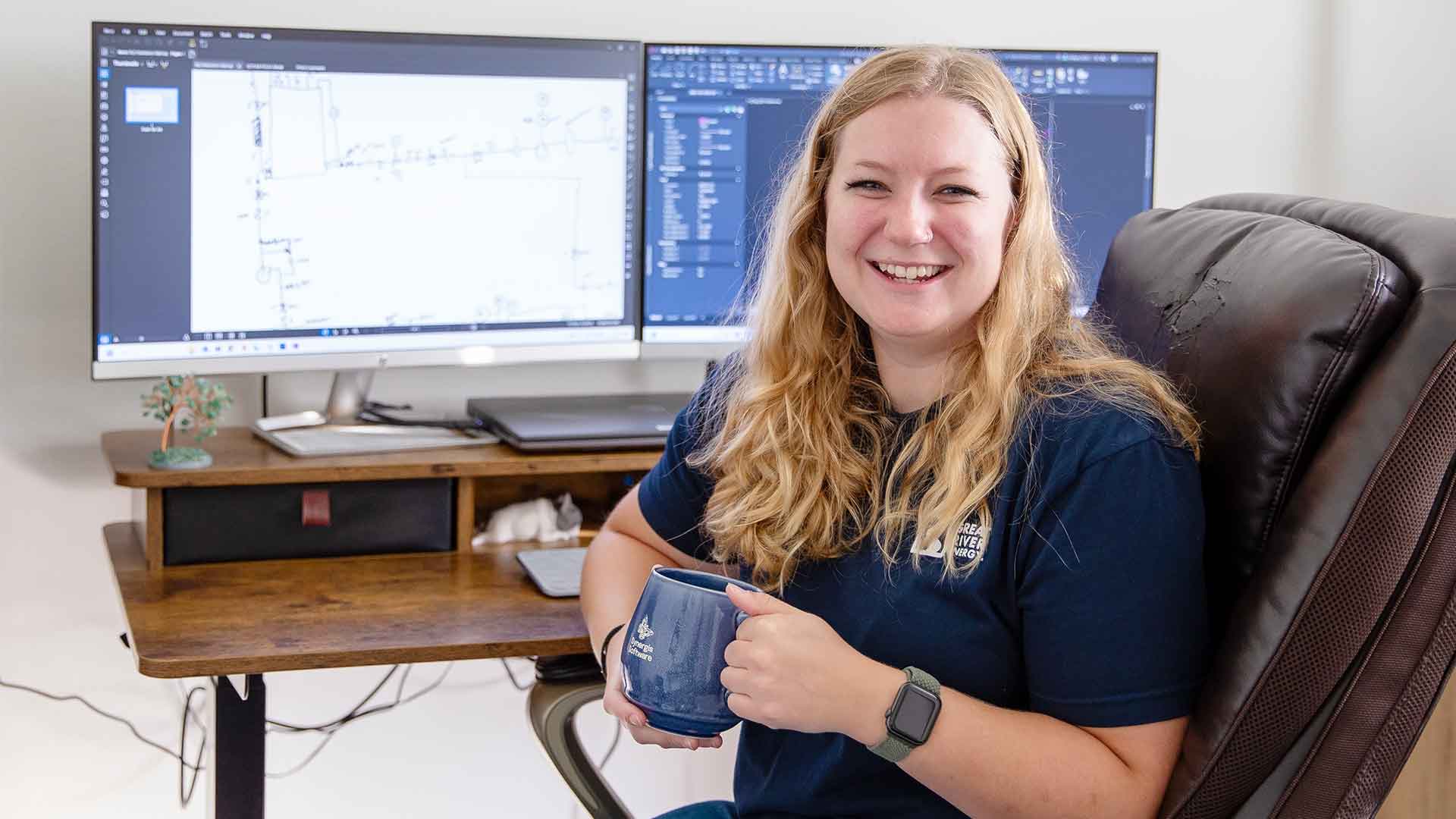The Anoka Technical College Mechanical Drafting and Design Technology program offers an Associate of Applied Science (AAS) degree, a diploma and a CAD Operator certificate to prepare graduates for high-demand careers in engineering companies that design and manufacture products.
Mechanical Drafting and Design Technology graduates work in a variety of settings:
- Manufacturing companies
- Engineering firms
- Electro-mechanical companies
- Contract firms
Why Study Mechanical Drafting & Design at Anoka Tech?

Hands-on education taught by industry experts

Great career for problem-solvers who are interested in engineering, mechanical and mathematical solutions

Work in a variety of industries with growth potential
Industry & Career Outlook
Potential Jobs:
- CADD Operator
- Designer
- CAD Drafter
- CAD Technician
- Mechanical Drafter
Salary Information:
Median Wage: $31.11 per hour
Top Earners: $42.62 per hour
Information provided is for Minnesota. See current data at mn.gov/deed.
Hear from our Students
Other Program Info
Take a self-guided virtual tour of our campus to see what it's like to be a student at Anoka Tech. View program labs, common student spaces, campus offices and more.
Students can choose to complete the Mechanical Drafting & Design programs part-time. Part-time students will take longer to complete their program than students who follow the full-time sequence. Because every course may not be offered each semester, it is important for part-time students to reach out to their faculty advisor for help in planning their long-term, part-time course sequence.
Below, new students can find the first semester part-time course options. After the first semester, work with your faculty advisor to plan future semesters.
First Semester Course Options
Fall Semester:
MECH 1216, MATH 1081, MECH 1200, MECH 2064
Spring Semester:
MECH 1229, MACH 1090, MECH 2074, ENGL 1107 OR ENGL 2105, MECH 2055
Notes: Course options differ depending on whether you plan to start in the fall or spring semester. The courses are listed in order of importance; for example, diploma and/or AAS degree students wishing to start in the fall semester with just 1 course would take MECH 1216, if they wish to take 2 courses they would take MECH 1216 with MATH 1081, etc.
Info for Current Students
Students must earn a cumulative 2.0 GPA or higher to be eligible for graduation from this program.
The Anoka Technical College Mechanical Drafting and Design Technology program offers an Associate of Applied Science (AAS) degree, a diploma and a CAD Operator certificate to prepare graduates for high-demand careers in engineering companies that design and manufacture products.
Mechanical Drafting and Design Technology graduates work in a variety of settings:
- Manufacturing companies
- Engineering firms
- Electro-mechanical companies
- Contract firms

Hands-on education taught by industry experts

Great career for problem-solvers who are interested in engineering, mechanical and mathematical solutions

Work in a variety of industries with growth potential
Industry & Career Outlook
Potential Jobs:
- CADD Operator
- Designer
- CAD Drafter
- CAD Technician
- Mechanical Drafter
Salary Information:
Median Wage: $31.11 per hour
Top Earners: $42.62 per hour
Information provided is for Minnesota. See current data at mn.gov/deed.
Other Program Info
Take a self-guided virtual tour of our campus to see what it's like to be a student at Anoka Tech. View program labs, common student spaces, campus offices and more.
Students can choose to complete the Mechanical Drafting & Design programs part-time. Part-time students will take longer to complete their program than students who follow the full-time sequence. Because every course may not be offered each semester, it is important for part-time students to reach out to their faculty advisor for help in planning their long-term, part-time course sequence.
Below, new students can find the first semester part-time course options. After the first semester, work with your faculty advisor to plan future semesters.
First Semester Course Options
Fall Semester:
MECH 1216, MATH 1081, MECH 1200, MECH 2064
Spring Semester:
MECH 1229, MACH 1090, MECH 2074, ENGL 1107 OR ENGL 2105, MECH 2055
Notes: Course options differ depending on whether you plan to start in the fall or spring semester. The courses are listed in order of importance; for example, diploma and/or AAS degree students wishing to start in the fall semester with just 1 course would take MECH 1216, if they wish to take 2 courses they would take MECH 1216 with MATH 1081, etc.
Info for Current Students
Students must earn a cumulative 2.0 GPA or higher to be eligible for graduation from this program.
The Anoka Technical College Mechanical Drafting and Design Technology program offers an Associate of Applied Science (AAS) degree, a diploma and a CAD Operator certificate to prepare graduates for high-demand careers in engineering companies that design and manufacture products.
Mechanical Drafting and Design Technology graduates work in a variety of settings:
- Manufacturing companies
- Engineering firms
- Electro-mechanical companies
- Contract firms

Hands-on education taught by industry experts

Great career for problem-solvers who are interested in engineering, mechanical and mathematical solutions

Work in a variety of industries with growth potential
Industry & Career Outlook
Potential Jobs:
- CADD Operator
- Designer
- CAD Drafter
- CAD Technician
- Mechanical Drafter
Salary Information:
Median Wage: $31.11 per hour
Top Earners: $42.62 per hour
Information provided is for Minnesota. See current data at mn.gov/deed.
Other Program Info
Take a self-guided virtual tour of our campus to see what it's like to be a student at Anoka Tech. View program labs, common student spaces, campus offices and more.
Students can choose to complete the Mechanical Drafting & Design programs part-time. Part-time students will take longer to complete their program than students who follow the full-time sequence. Because every course may not be offered each semester, it is important for part-time students to reach out to their faculty advisor for help in planning their long-term, part-time course sequence.
Below, new students can find the first semester part-time course options. After the first semester, work with your faculty advisor to plan future semesters.
First Semester Course Options
Fall Semester:
MECH 1216, MECH 2064, MECH 1200
Spring Semester:
MECH 1229, MACH 1090, MECH 2074
Notes: Course options differ depending on whether you plan to start in the fall or spring semester. The courses are listed in order of importance; for example, diploma and/or AAS degree students wishing to start in the fall semester with just 1 course would take MECH 1216, if they wish to take 2 courses they would take MECH 1216 with MATH 1081, etc.
Info for Current Students
Students must earn a cumulative 2.0 GPA or higher to be eligible for graduation from this program.
Start Dates:
Fall semester: August
Spring semester: January**
**Students who start in the spring will need longer to complete due to course prerequisites.



